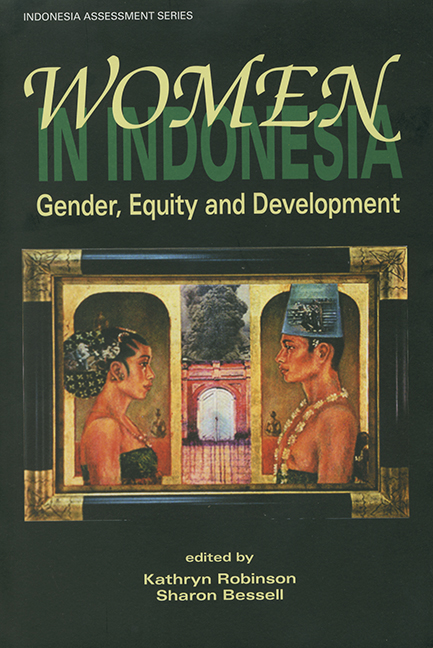Book contents
- Frontmatter
- Contents
- Tables
- Figures
- Contributors
- Acknowledgments
- Glossary
- Prologue
- 1 Introduction to the Issues
- 2 The Mega Factor in Indonesian Politics: A New President or a New Kind of Presidency?
- 3 The Downfall of President Abdurrahman Wahid: A Return to Authoritarianism?
- 4 The Year in Review: From Blind Man's Bluff to Mega Expectations
- 5 Further Comments on the Economy, with a Gender Perspective
- 6 Institution Building: An Effort to Improve Indonesian Women's Role and Status
- Commentary
- 7 Feminism in Indonesia in an International Context
- 8 Gay and Lesbi Subjectivities, National Belonging and the New Indonesia
- 9 And the Winner Is … Indonesian Women in Public Life
- 10 Indonesian Women Artists: Transcending Compliance
- 11 Literature, Mythology and Regime Change: Some Observations on Recent Indonesian Women's Writing
- 12 Women and the Labour Market during and after the Crisis
- 13 Women's International Labour Migration
- 14 Customary Institutions, Syariah Law and the Marginalisation of Indonesian Women
- 15 Women's Grassroots Movements in Indonesia: A Case Study of the PKK and Islamic Women's Organisations
- 16 Women's Activism against Violence in South Sulawesi
- 17 Gender Mainstreaming and Sex-disaggregated Data
- 18 The Changing Indonesian Household
- 19 Women, Family Planning and Decentralisation: New Variations on Old Themes
- 20 Men, Women and Community Development in East Nusa Tenggara
- References
- Index
- INDONESIA ASSESSMENT SERIES
14 - Customary Institutions, Syariah Law and the Marginalisation of Indonesian Women
Published online by Cambridge University Press: 21 October 2015
- Frontmatter
- Contents
- Tables
- Figures
- Contributors
- Acknowledgments
- Glossary
- Prologue
- 1 Introduction to the Issues
- 2 The Mega Factor in Indonesian Politics: A New President or a New Kind of Presidency?
- 3 The Downfall of President Abdurrahman Wahid: A Return to Authoritarianism?
- 4 The Year in Review: From Blind Man's Bluff to Mega Expectations
- 5 Further Comments on the Economy, with a Gender Perspective
- 6 Institution Building: An Effort to Improve Indonesian Women's Role and Status
- Commentary
- 7 Feminism in Indonesia in an International Context
- 8 Gay and Lesbi Subjectivities, National Belonging and the New Indonesia
- 9 And the Winner Is … Indonesian Women in Public Life
- 10 Indonesian Women Artists: Transcending Compliance
- 11 Literature, Mythology and Regime Change: Some Observations on Recent Indonesian Women's Writing
- 12 Women and the Labour Market during and after the Crisis
- 13 Women's International Labour Migration
- 14 Customary Institutions, Syariah Law and the Marginalisation of Indonesian Women
- 15 Women's Grassroots Movements in Indonesia: A Case Study of the PKK and Islamic Women's Organisations
- 16 Women's Activism against Violence in South Sulawesi
- 17 Gender Mainstreaming and Sex-disaggregated Data
- 18 The Changing Indonesian Household
- 19 Women, Family Planning and Decentralisation: New Variations on Old Themes
- 20 Men, Women and Community Development in East Nusa Tenggara
- References
- Index
- INDONESIA ASSESSMENT SERIES
Summary
In Langsa Aceh Timur, on 2 October 1999, a group of unidentified masked men stopped a bus carrying women workers of PT Wira Lanao. The women were made to get off the bus, and the men cut off their hair by force … According to the perpetrators, the women workers were wrong to go out without covering their hair (Serambi Indonesia, 5 October 1999; Noerdin 2000: 8).
Alifah (not her real name), a high school graduate from Garut (West Java), was asked by her mother to visit her grandmother who lived on the border of Tasikmalaya and Ciamis district in West Java. Because of the distance, Alifah, who wore a jilbab to cover her hair, started very early in the morning. However, because the roads and transportation links were not very good, at around 7 in the evening Alifah had only got as far as the city of Tasikmalaya … After waiting for around one hour at the bus terminal, she eventually found a public pick-up car that was going to the village. To her utter bewilderment, as the car was leaving the terminal, a group of men stopped the vehicle and forced Alifah out of the car … Alifah heard some of them saying that she had violated a regional regulation of syariah law by going out at night without being accompanied by her husband or a male relative. They took off her jilbab and shaved off her hair as a punishment (Suara Rahima, No. 2, 1 August 2001: 34).
The implementation of regional autonomy in Indonesia since 2001 has opened the door for people in the regions to breathe new life into customary institutions that had been repressed by the Soeharto government for more than three decades. As both Islam and customary institutions had suffered under Soeharto as he sought to homogenise the country and extend his control, it is not surprising that in certain regions the current resurgence of customary institutions is closely linked to demands for the implementation of syariah law. This chapter looks at the relationship between regional autonomy, the revitalisation of customary institutions and discriminatory measures against women contained in provincial regulations for the implementation of syariah law. Currently, none of these regulations have any legal standing because they have not been endorsed by the national parliament (DPR).
- Type
- Chapter
- Information
- Women in IndonesiaGender, Equity and Development, pp. 179 - 186Publisher: ISEAS–Yusof Ishak InstitutePrint publication year: 2002



